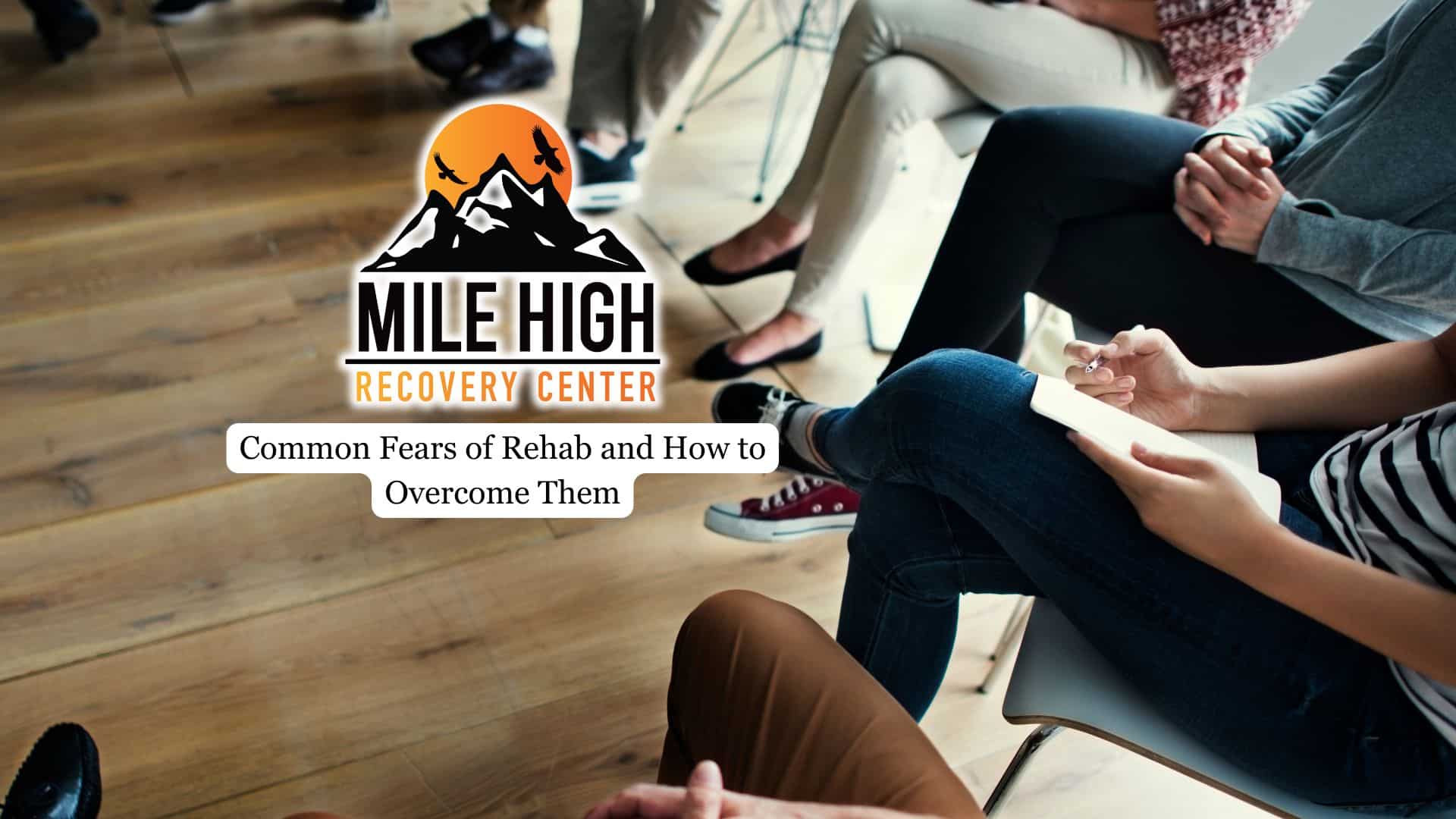Vicodin Addiction: A Growing Concern
Vicodin addiction is a growing concern, impacting countless individuals and their families across the nation. Currently, over two million Americans suffer from substance use disorders (SUD) related to prescription opioid pain relievers.1
Finding effective solutions to this challenging issue requires a comprehensive approach that addresses both the physical and psychological aspects of addiction.

Vicodin Addiction Solutions at MHRC
For those seeking help, Mile High Recovery Center (MHRC) stands as a beacon of hope. We offer specialized treatment tailored to the unique needs of individuals battling Vicodin addiction.
Located in the heart of Denver, Colorado, MHRC is dedicated to providing comprehensive addiction and mental health treatment. Our mission is to empower individuals to reclaim their lives through a combination of cutting-edge medical interventions and compassionate care.
At MHRC, we understand each person’s recovery is unique. We strive to create personalized treatment plans that foster lasting healing and transformation. Our commitment is underscored by the fact that nearly 21 million Americans suffer from at least one addiction, yet only 10% receive treatment.2
Vicodin Addiction Solutions: Specialized Treatment Approach
At MHRC, our specialized treatment approach for Vicodin addiction integrates evidence-based practices with holistic healing methods. This dual approach ensures we address chemical dependency. It also addresses the underlying emotional and psychological factors contributing to the addiction.
Our evidence-based practices include medically supervised detoxification, cognitive behavioral therapy (CBT), and medication-assisted treatment (MAT) . These are designed to provide a solid foundation for recovery.
Holistic methods, such as mindfulness and yoga, support overall well-being and encourage healthy coping mechanisms for long-term sobriety.
By combining these strategies, our MHRC team offers a comprehensive and compassionate path to overcoming Vicodin addiction. We guide individuals toward a healthier, more fulfilling life.
Understanding Vicodin Addiction and its Effects
Vicodin, a prescription medication combining hydrocodone and acetaminophen, is commonly prescribed to relieve moderate to severe pain. While effective for pain management, Vicodin has a high potential for abuse and addiction due to its opioid properties.3
Vicodin addiction occurs when individuals misuse the drug. This leads to physical dependence and a compulsive need to continue using it despite adverse consequences.
The prevalence of Vicodin addiction is a significant concern in the U.S. According to the National Institute on Drug Abuse (NIDA), approximately 10 million people aged 12 or older misused opioids, including Vicodin, in 2019.4 Opioid overdoses accounted for nearly 70% of all drug overdose deaths in 2019.
Effects of Vicodin Addiction
Vicodin addiction affects individuals physically, psychologically, and socially. The immediate effects of misuse include euphoria, relaxation, and pain relief. These can quickly lead to tolerance and the need for higher doses to achieve the same effects.
Over time, individuals may experience:
- Physical Effects: Nausea, constipation, drowsiness, respiratory depression, and liver damage (due to acetaminophen).
- Psychological Effects: Mood swings, anxiety, depression, cognitive impairment, and cravings.
- Social Effects: Strained relationships, financial difficulties, legal issues, and decreased productivity.
Underscoring the Need for Vicodin Addiction Solutions
The challenges Vicodin addiction presents are substantial. This affects the person using the drug and also families, workplaces, and the broader community.
There’s also the economic burden, including healthcare costs, lost productivity, and criminal justice involvement. This is estimated to be over $78 billion annually in the U.S.
Complexities of Treating Vicodin Addiction
Treating Vicodin addiction is complex due to its opioid properties and the potential for physical and psychological dependence.
Successful treatment requires addressing multiple facets of the addiction, including:
- Physical Dependence: Vicodin’s opioid component leads to significant physical dependence. Withdrawal symptoms, such as muscle aches, sweating, agitation, and insomnia, can be severe. They often require medically supervised detoxification to manage safely.
- Psychological Dependence: The psychological grip of Vicodin addiction can be profound. It can necessitate comprehensive therapy to address underlying mental health issues and behavioral patterns. Cognitive behavioral therapy (CBT) and other evidence-based practices help individuals understand their addiction and develop strategies to cope with triggers and cravings.
- Holistic Healing: Integrating holistic methods, such as mindfulness, yoga, and nutritional support, enhances overall well-being and supports sustainable recovery. These approaches help individuals rebuild their lives and establish healthy habits.
- Long-Term Support: Recovery from Vicodin addiction is a long-term process. Ongoing support through counseling, peer support groups, and aftercare programs is crucial for maintaining sobriety and preventing relapse.
Understanding Vicodin Addiction Solutions
Understanding Vicodin addiction solutions involves recognizing its widespread impact, severe effects, and the multifaceted approach required for effective treatment.
By addressing the physical and psychological components of addiction, comprehensive treatment programs, like those at MHRC, can provide the necessary support to achieve lasting recovery and rebuild lives.
Comprehensive Assessment and Diagnosis in Vicodin Addiction Solutions
At MHRC, we believe a comprehensive assessment is the cornerstone of effective Vicodin addiction solutions. Our multidisciplinary approach ensures that each individual’s unique situation is thoroughly evaluated. This creates a tailored treatment plan that addresses all aspects of their addiction.
The assessment process encompasses physical, psychological, and social evaluations, providing a holistic understanding of the individual’s needs.
Vicodin Addiction Solutions: Physical Evaluation
Vicodin addiction solutions typically include a physical evaluation. This will include:
Medical History
We conduct a detailed review of the individual’s medical history. This may cover any previous or current health conditions, medications, and history of substance use.
Physical Examination
We conduct a thorough physical examination to assess the individual’s overall health and identify any immediate medical concerns we may need to address during treatment.
Laboratory Tests
We perform blood and urine tests to detect the presence of Vicodin and other substances. We also evaluate liver and kidney function and assess other vital health markers affected by substance use.
Vicodin Addiction Solutions: Psychological Evaluation
Addiction doesn’t exist in isolation; it is often a result of untreated mental health symptoms. That’s why MHRC addresses the mental health challenges related to substance use.
We do this through:
Mental Health Assessment
Our mental health professionals conduct comprehensive evaluations to identify any co-occurring mental health disorders. These could pinpoint depression, anxiety, or PTSD, which often accompany substance use disorders.
Behavioral Analysis
We assess the individual’s behavioral patterns related to substance use. This includes triggers, coping mechanisms, and the impact of addiction on daily functioning.
Cognitive Assessment
Cognitive assessments help determine any impairments in memory, attention, and decision-making abilities caused by prolonged Vicodin use.
Vicodin Addiction Solutions: Social Evaluation
To get a comprehensive assessment of an individual’s substance use, MHRC also looks into their social health:
Family and Social History
Understanding the individual’s family dynamics, social support network, and living environment provides critical context for developing an effective treatment plan.
Lifestyle and Occupational Impact
Evaluations of how Vicodin addiction has affected the individual’s work, education, and social interactions. This helps plan for comprehensive recovery and reintegration into society.
Legal and Financial Status
Assessing any legal issues, financial difficulties, or other social determinants of health that may influence the individual’s recovery journey.
Importance of Thorough Assessments in Vicodin Addiction Solutions
A thorough assessment is crucial in developing individualized treatment plans tailored to each person’s needs. The complexities of Vicodin addiction require a nuanced approach to address the multifaceted nature of addiction.
Here are key reasons why comprehensive assessment is vital:
- Personalized Care: Every individual’s experience with addiction is unique. A thorough assessment ensures that the treatment plan is customized to address the specific physical, psychological, and social factors influencing their addiction.
- Identifying Co-Occurring Disorders: Many individuals with Vicodin addiction also suffer from co-occurring mental health disorders. Identifying these conditions early allows for integrated treatment that addresses addiction and mental health issues. Early detection also improves overall outcomes.
- Targeted Interventions: By understanding the individual’s specific triggers, behaviors, and health status, we can implement targeted interventions. These are more likely to be effective and sustainable in the long term.
- Holistic Approach: A comprehensive assessment ensures that all aspects of the individual’s well-being are considered. This allows for a holistic approach to treatment that promotes overall health and recovery.
- Monitoring Progress: Initial assessments provide baseline data that can be used to monitor the individual’s progress throughout treatment. This allows for adjustments to the treatment plan as needed to ensure continued success.
At MHRC, our commitment to thorough assessment and individualized care sets the foundation for effective treatment and lasting recovery.
By understanding each person’s unique challenges and strengths, we empower individuals to overcome Vicodin addiction. We also help them build healthier, more fulfilling lives.
Utilizing Medication-Assisted Treatment (MAT) in Recovery
MAT is a crucial component of Vicodin addiction treatment. It integrates medications with counseling and behavioral therapies to address substance use disorders comprehensively.
MAT options for Vicodin addiction include opioid replacement therapies and medications that manage withdrawal symptoms:
Vicodin Addiction Solutions: Opioid Replacement Therapies
Some opioid replacement therapies utilized in recovery include:
- Methadone: A long-acting opioid agonist that helps reduce cravings and withdrawal symptoms. It acts on the same opioid receptors as Vicodin without producing the same high.
- Buprenorphine: A partial opioid agonist that reduces cravings and withdrawal symptoms. It also lowers the risk of misuse compared to full agonists.
- Naltrexone: An opioid antagonist that blocks the effects of opioids. This prevents the euphoric effects of Vicodin and reduces the likelihood of relapse.
Vicodin Addiction Solutions: Medications for Managing Withdrawal Symptoms
Some medications utilized to help alleviate otherwise uncomfortable withdrawal symptoms include:
- Clonidine: Used to alleviate withdrawal symptoms such as anxiety, agitation, muscle aches, and sweating.
- Lofexidine: Similar to clonidine, it helps reduce the severity of withdrawal symptoms and aids in the detoxification process.
Vicodin Addiction Solutions: Role of MAT in Stabilizing Individuals in Early Recovery
MAT plays a vital role in stabilizing individuals during the early stages of recovery from Vicodin addiction by:
Reducing Cravings
Medications like buprenorphine and methadone decrease cravings. This allows individuals to focus on their recovery without the constant urge to use Vicodin.
Managing Withdrawal Symptoms
By alleviating withdrawal symptoms, MAT helps individuals undergo detoxification more comfortably and safely.
Preventing Relapse
Naltrexone blocks the euphoric effects of opioids, making relapse less appealing. Consistent use of MAT supports long-term sobriety by reducing the risk of relapse.
Behavioral, Holistic, and Integrated Treatments in Vicodin Addiction Solutions
Below are the types of comprehensive behavioral therapies and holistic approaches to help overcome addiction challenges:
Behavioral Therapies in Vicodin Addiction Solutions
Behavioral therapies are integral to treating Vicodin addiction. This provides individuals with the tools to address the psychological aspects of their addiction.
At MHRC, we utilize evidence-based therapies such as:
Cognitive Behavioral Therapy (CBT)
CBT focuses on identifying and changing negative thought patterns and behaviors associated with addiction. It helps individuals develop coping strategies, enhance problem-solving skills, and manage stress without relying on Vicodin.
Dialectical Behavioral Therapy (DBT)
DBT combines CBT with mindfulness practices. This helps individuals regulate emotions, tolerate distress, and improve interpersonal relationships. It’s particularly effective for individuals with co-occurring mental health disorders.
Therapies like CBT and DBT delve into the root causes of addiction, such as trauma, anxiety, or depression. These help individuals work through these issues.
These therapies equip individuals with practical skills to manage triggers, stress, and negative emotions in healthier ways. Reshaping thought patterns and behaviors can help break the cycle of addiction and encourage healthier habits.
Holistic Approaches in Vicodin Addiction Solutions
At MHRC, we integrate holistic therapies into Vicodin addiction treatment to address the physical, emotional, and spiritual dimensions of recovery.
These therapies include:
- Mindfulness Meditation: Enhances awareness and emotional regulation, reducing stress and promoting a sense of calm.
- Yoga: Combines physical exercise with mindfulness, helping individuals improve physical health and mental well-being.
- Nutritional Counseling: Ensures that individuals receive balanced nutrition. This is vital for physical recovery and mental health.
How Holistic Approaches Address Recovery Dimensions
Holistic approaches contribute to recovery by addressing:
- Physical Health: Activities like yoga and nutritional counseling promote physical well-being, which is essential for overall recovery.
- Emotional Health: Mindfulness and meditation help individuals manage stress and emotions, fostering mental resilience.
- Spiritual Health: Holistic therapies often encourage personal growth and self-awareness, supporting a deeper sense of purpose and fulfillment.
Dual Diagnosis Treatment in Vicodin Addiction Solutions
Many individuals with Vicodin addiction also suffer from co-occurring mental health disorders. These include depression, anxiety, or PTSD. This dual diagnosis requires integrated treatment that addresses the addiction and mental health conditions simultaneously.
Vicodin Addiction Solutions: Integrated Treatment at MHRC
At MHRC, we provide comprehensive assessment and integrated care for dual diagnosis by:
- Identifying both substance use and mental health disorders through thorough evaluations.
- Coordinating treatment plans that address both conditions. This combines MAT, behavioral therapies, and holistic approaches.
- Providing continuous care and support to manage both addiction and mental health issues, promoting overall stability and recovery.

Vicodin Addiction Solutions: Relapse Prevention and Aftercare
Maintaining long-term recovery from Vicodin addiction requires effective relapse prevention strategies, which include:
- Identifying Triggers: Teaching individuals to recognize and avoid triggers that may lead to relapse.
- Developing Coping Skills: Equipping individuals with strategies to manage stress and cravings without turning to Vicodin.
- Building Support Networks: Encouraging participation in support groups and counseling to provide ongoing encouragement and accountability.
Vicodin Addiction Solutions: Aftercare Planning and Ongoing Support Services
MHRC offers comprehensive aftercare planning and ongoing support services, including:
- Continued therapy sessions to address emerging issues and reinforce coping skills.
- Regular group meetings that provide peer support and shared experiences.
- Routine check-ins and monitoring to ensure sustained progress and address any setbacks promptly.
Vicodin Addiction Solutions: Family and Social Support
Family and social support networks play a critical role in Vicodin addiction treatment and recovery. They provide emotional support, encouragement, and practical assistance. These are vital for sustained recovery.
Vicodin Addiction Solutions: Resources Available to Support Individuals and Their Loved Ones
MHRC offers various resources to support individuals and their families, including:
- Family Therapy: Sessions that involve family members to address dynamics and improve communication and relationships.
- Educational Programs: Workshops and seminars that educate families about addiction, recovery, and how to support their loved ones effectively.
- Support Groups: Groups for families and friends of individuals in recovery. This provides a space to share experiences and gain support from others facing similar challenges.
By integrating these comprehensive strategies, MHRC ensures that individuals battling Vicodin addiction receive the care needed for lasting recovery. This includes holistic, compassionate, and effective care.
Empowering Change in Vicodin Addiction Recovery
MHRC offers a comprehensive range of treatment strategies for Vicodin addiction. These include MAT, evidence-based behavioral therapies, holistic approaches, dual diagnosis treatment, relapse prevention, and robust family and social support systems.
These integrated and personalized treatment options are designed to address each individual’s unique needs. The goal is to promote lasting recovery and overall well-being.
Reach Out and Begin Healing Today
If you or someone you know is struggling with Vicodin addiction, we invite you to seek support at MHRC. Explore our personalized treatment options and take the first step toward a healthier, more fulfilling life. Together, we can empower change and guide you on your journey to recovery.
Resources
- https://www.samhsa.gov/data/sites/default/files/reports/rpt35319/2020NSDUHFFR1PDFW102121.pdf
- https://www.aamc.org/news/21-million-americans-suffer-addiction-just-3000-physicians-are-specially-trained-treat-them
- https://www.deadiversion.usdoj.gov/drug_chem_info/hydrocodone.pdf
- https://ncsacw.acf.hhs.gov/files/mat-primer-508.pdf






